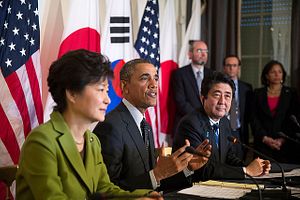The Diplomat contributors Mercy Kuo and Angie Tang recently spoke with Torkel Patterson – board member of the Central Japan Railway Company, Global Insights Corporation, The Northeast Maglev, The Olmsted Foundation, and Pacific Forum CSIS, vice chairman of the International High Speed Rail Association, and formerly president of Raytheon International Inc., who also has held various government posts in three U.S. administrations, including special assistant to the President for Asia, deputy assistant secretary of State for South Asia, and senior country director for Japan in the Office of the Secretary of Defense.
How would you assess the U.S. administration’s Asia pivot?
The Obama Administration’s so-called pivot to Asia, while born out of a political desire to show strength when actually cutting force structure, especially in Europe, has begun to bear fruit with newer assets, particularly U.S. Navy and Air Force committed to the Indo-Pacific region. Additionally, the increased operational tempo of U.S. forces in East Asia has begun to demonstrate to the region that the U.S. is taking the pivot seriously.
How might the U.S. rebalance to Asia change or develop under the next U.S. president?
Though the pivot was not designed to militarily target China, it obviously evolved in response to China’s military assertiveness in the region. The pivot was originally an attempt to package a U.S. position, making it appear stronger than it actually was. It has, however, become a real policy and will continue to be important as long as the U.S. military services are allowed to operationalize it. I believe that any U.S. president would not give up this tool of reassurance to our allies and deterrence to China.
From formulating strategy to policy implementation, how might the next U.S. administration optimize the policymaking process and enhance diplomacy efforts?
The next administration should empower the Department of Defense (DoD) and State Department through confirmed officials – Assistant Secretaries and above – and reduce the number of unconfirmed officials significantly, including National Security Council (NSC) staff, if it is to have effective, coherent and accountable policymaking. The number of senior unconfirmed officials rose significantly under President Obama’s administration and must be cut back significantly. Otherwise State, DoD and NSC will continue to fight each other and the secretaries’ power will continue to be eviscerated.
The United States and Japan share critical common interests. What elements of U.S. national power and leadership are essential in ensuring constructive bilateral relations?
The U.S. and Japan must improve their economic strength by getting their economic houses in order so as to properly fund defense and foreign assistance budgets robustly. Without stronger U.S. and Japanese economies, U.S. and Japan’s ability to influence other states will decline. Additionally, both Japan and the United States must ensure the TPP is ratified and fully implemented. This is strategically very important. United States and Japanese leadership must continue to stress the strategic and economic advantages of the bilateral relationship to their respective publics. The public must have buy-in into the alliance for it to be sustainable for another 50 years.
How should the next U.S. president prioritize Asia policy challenges in the first 100 days of office?
With the caveat that priority will shift depending on the demands of the day, Asia policy challenges to be addressed include:
1) Reassure allies with passage of the Trans-Pacific Partnership (TPP) and continued or increased forward deployment presence (not necessarily troops)
2) Support ASEAN integration, especially market integration, transparency and expand the TPP as appropriate
3) Engage China while speaking frankly as necessary from a position of strength, but never pushing political change. China policy should continue to promote: respect for international norms; rule of law and sanctity of commercial contracts; an independent judiciary; and religious freedom, i.e. freedom of worship, but short of political activism
4) Cement firm support for India, promoting India’s civil nuclear capabilities in partnership with the U.S. and Japan; clearly indicate to Pakistan that terrorist acts in India will not be condoned
5) Maintain strong “For Assistance” support and engagement with Bangladesh, Nepal and Pakistan as well as Central Asian republics
6) Seek a modus vivendi with Russia conducive to stability and peace; encourage settlement of the Northern Territories issue with Japan
7) Continue harsh sanctions against North Korea and do not engage until it is ready to stop its nuclear development. Respond to any military incursion with overwhelming force and let the leadership know that North Korea as a state will be destroyed and killed if any massive, nuclear or chemical/biological weapons are used. Be firm with China, including sending naval forces into the Eastern Sea to gain their support for sanctions. However, do not seek regime change if North Korea agrees to controls on weapons of mass destruction.
Mercy A. Kuo is an advisory board member of CHINADebate and was previously director of the Southeast Asia Studies and Strategic Asia Programs at the National Bureau of Asian Research. Angie O. Tang is Senior Advisor of Asia Value Advisors, a leading venture philanthropy advisory firm based in Hong Kong.

































